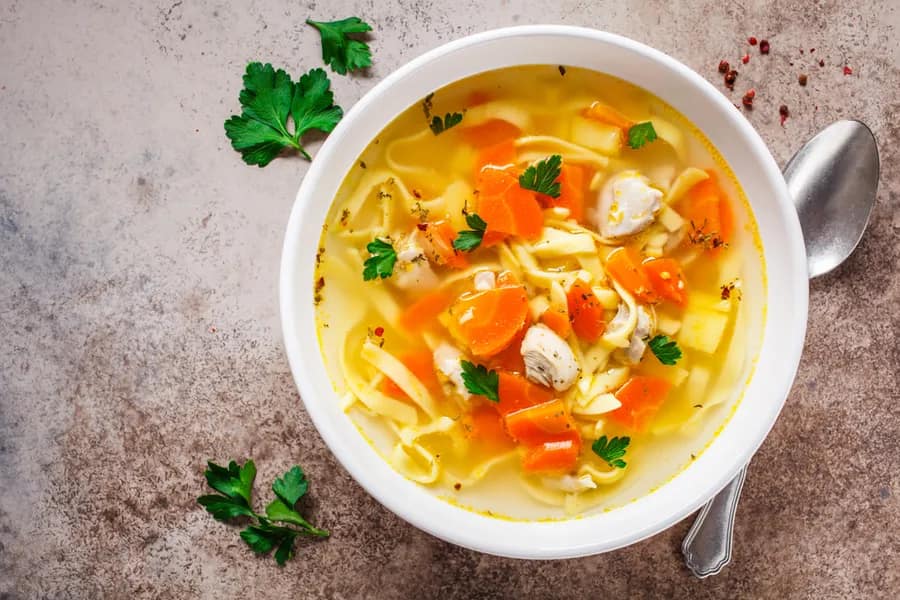Does Chicken Soup Really Help When You’re Sick? A Nutrition Specialist Explains What’s Behind the Beloved Comfort Food

Preparing a bowl of chicken soup for a loved one when they’re sick has been a common practice throughout the world for centuries. Today, generations from virtually every culture swear to the benefits of chicken soup. In the U.S., the dish is typically made with noodles, but different cultures prepare the soothing remedy their own way.
Chicken soup as a therapy can be traced back to 60 A.D. and Pedanius Dioscorides, an army surgeon who served under the Roman emperor Nero, and whose five-volume medical encyclopedia was consulted by early healers for more than a millennium. But the origins of chicken soup go back thousands of years earlier, to ancient China.
So, with cold and flu season in full swing, it’s worth asking: Is there any science to back the belief that it helps? Or does chicken soup serve as just a comforting placebo, that is, providing psychological benefit while we’re sick, without an actual therapeutic benefit?
As a registered dietitian and professor of dietetics and nutrition, I’m well aware of the appeal of chicken soup: the warmth of the broth and the rich, savory flavors of the chicken, vegetables and noodles. What gives the soup that distinctive taste is “umami” – the fifth category of taste sensations, along with sweet, salty, sour and bitter. It is often described as having a “meaty” taste.
May reduce inflammation and stuffy nose
Inflammation is part of the body’s natural response to injury or illness; inflammation occurs when white blood cells migrate to inflamed tissue to assist with healing. When this inflammatory process occurs in the upper airway, it results in common cold and flu symptoms, such as a stuffy or runny nose, sneezing, coughing and thickened mucus.
Conversely, lower white blood cell activity in the nasal passages can reduce inflammation. And interestingly, research shows that chicken soup can in fact lower the number of white blood cells traveling to inflamed tissues. It does this by directly inhibiting the ability of neutrophils, a type of white blood cell, to travel to the inflamed tissue.

Key ingredients
To truly understand the soothing and healing effects of chicken soup, it’s important to consider the soup’s ingredients. Not all chicken soups are packed with nutritious healing properties. For instance, the ultraprocessed canned versions of chicken soup, both with and without noodles, lack many of the antioxidants found in homemade versions. Most canned versions of chicken soup are nearly devoid of hearty vegetables.
The core nutrients in homemade versions of the soup are what set these varieties apart from canned versions. Chicken provides the body with a complete source of protein to combat infection. Vegetables supply a wide array of vitamins, minerals and antioxidants. If prepared the American way, noodles provide an easily digestible source of carbohydrate that your body uses for energy and recovery.
Even the warmth of chicken soup can help. Drinking the liquid and inhaling the vapors increase the temperature of nasal and respiratory passages, which loosens the thick mucus that often accompanies respiratory illnesses. Compared with hot water alone, studies show chicken soup is more effective at loosening mucus.
The herbs and spices sometimes used in chicken soup, such as pepper and garlic, also loosen mucus. The broth, which contains water and electrolytes, helps with rehydration.
So, to maximize the health benefits of chicken soup, I recommend a homemade variety, which can be prepared with carrots, celery, fresh garlic, herbs and spices, to name a few ingredients. But if you need a more convenient option, look at the ingredients and nutrition facts label, and choose soups with a variety of vegetables over an ultraprocessed, nutrient-depleted kind.
In short, the latest science suggests that chicken soup – though not an out-and-out cure for colds and flu – really helps with healing. Looks like Grandma was right again.
Latest Articles

Does Chicken Soup Really Help When You’re Sick? A Nutrition Specialist Explains What’s Behind the Beloved Comfort Food
Preparing a bowl of chicken soup for a loved one when they’re sick has been a common practice...

Aerobic and Strength Training Exercise Combined Can Be an Elixir for Better Brain Health in Your 80s and 90s, New Study Finds
People in the oldest stage of life who regularly engage in aerobic activities and strength training exercise...

How to Overcome Repetitive Negative Thinking Through Meditation
Do you ever find yourself caught in a cycle of negative thoughts? Maybe you ruminate on past mistakes, worry excessively about the...

Can Coffee or a Nap Make Up for Sleep Deprivation? A Psychologist Explains Why There’s No Substitute For Shut-Eye
There is no denying the importance of sleep. Everyone feels better after a good night of sleep, and lack of sleep can have profoundly negative...